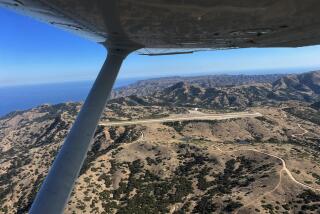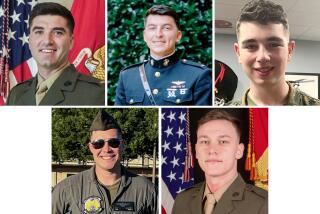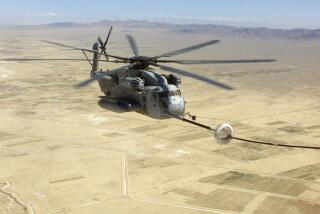Would-Be Warriors : Deployment: Disappointed members of El Toro squadron go to Japan--not the Gulf War.
EL TORO — Everywhere Maj. Earl Wederbrook turned during a Christmas visit back home to Florida, he seemed to face the same question from old friends and neighbors: “Why aren’t you there?”
There, of course, was the Persian Gulf. The 36-year-old Marine jet pilot said he grew so tired of explaining his absence from the region “that after awhile I just started limping around, saying it was an old war wound.”
After six months of watching and waiting at the Marine Corps Air Station at El Toro, Wederbrook finally got the chance Wednesday morning to direct six $25-million fighter jets as they screamed deafeningly out of Orange County airspace en route to their next assignment.
It felt good. But even as the F/A-18 Hornets, the Marines’ top-line fighter aircraft, readied their twin engines for takeoff, there was a sense of regret among squadron members that their assignment would not take them into the Gulf, a place where jet pilots with such nicknames as “Shadow” and “Horse” feel they should be in a time of war.
Instead, Wederbrook and other members of Marine Night Fighter Squadron 531 out of El Toro will be deployed to a U.S. base at Iwakuni, Japan, southwest of Hiroshima, in a reshuffling of assignments connected to Operation Desert Storm and the massive movement of aircraft and equipment to the Gulf. The fighters will cross the Pacific with the aid of in-flight refueling.
“We all want to be there (the Gulf),” said Capt. Dave Snyder, a 27-year-old Hornet pilot from Boston. “It’s like getting to the big game and having to watch it on television with a broken leg.”
In Japan, the 531st will replace another El Toro-based Hornet squadron that has been there since early last year--a stay prolonged by the war. The other unit, the 323rd attack squadron, will return home to Orange County on Friday.
Nicknamed the Gray Ghosts, the 531st is headquartered at El Toro in a hangar known locally as the ghost town, and that is just what it will be for at least the next six months--and most likely longer--because of the wartime demand on personnel.
“I’m planning on a year and hoping it’ll be shorter,” a tearful Kami Frese said as she bade goodby to her husband, Capt. Michael A. Frese, a pilot with the 531st.
Theirs is a supporting, “peacekeeper” role, responsible for helping man U.S. installations in the Philippines, Korea and Japan in a region now overshadowed in the world’s eye by the Middle East. From Japan, squad members face the prospect of a move west to the Gulf, depending on the course of the war and U.S. military needs.
Among some of the squadron’s non-pilots--mechanics, drivers and other support staff in less glamorous positions--there was more excitement about the unit’s assignment. Some said they’d just as soon not be in the war zone.
Lance Cpl. Conrad Alston, a 19-year-old squadron electrician originally from Pittsburgh, explained the differing sentiments this way: “For the pilots, they’re right in the action, in the air--for the rest of us, we’d be helping out too, but it’s not quite the same.”
Two of the four Hornet squadrons at El Toro were sent to the Gulf, and the pilots of the 531st are especially sensitive about their non-war assignment.
They see it as the “the luck of the draw” that deprived them of the chance to put their hundreds of hours of ground and air maneuvers to the test, along with the opportunity to see how the versatile and deadly F/A-18, equipped with 20mm rotary cannons and Sparrow and Sidewinder missiles, performs in combat.
Asked before takeoff how it felt not to be a part of Operation Desert Storm, Frese said: “I feel like I am a part of Desert Storm. . . . I’m just not going over and having shots fired at me yet.”
Frese, a burly redhead whom the Marines call Horse, said that in his months of waiting at El Toro he has run over and over in his mind a hypothetical scene that is not far from his own experience:
A little girl, say 4 years old, walks up to him in the grocery and asks him: “ ‘How come you’re not in Saudi Arabia?’ . . . And I can’t even really tell a little 4-year-old girl why, really.”
More to Read
Get the L.A. Times Politics newsletter
Deeply reported insights into legislation, politics and policy from Sacramento, Washington and beyond. In your inbox three times per week.
You may occasionally receive promotional content from the Los Angeles Times.










